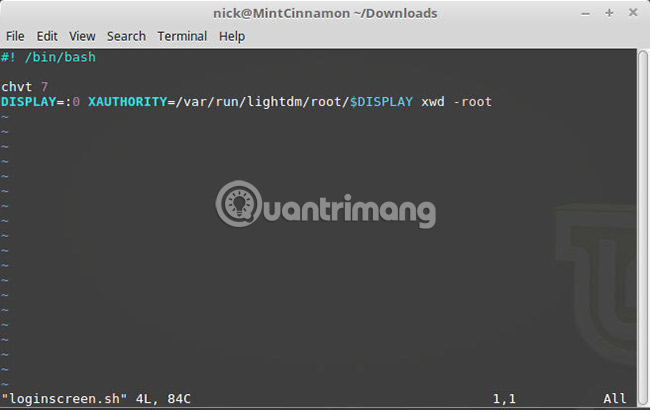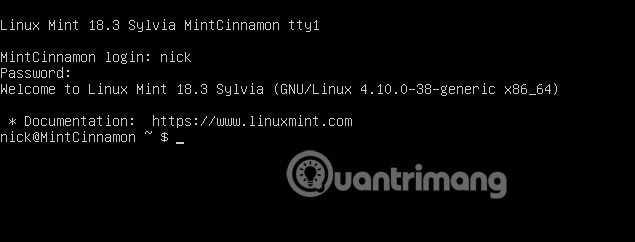How to take a screenshot of the login screen in Linux
There are many screen capture utilities available for Linux and most work very well. But strangely, none of these tools have the ability to take a screenshot of the login screen.
However, there are still some ways to get screenshots in Linux logon. Today's article will introduce you to 2 ways to do this. Method 1 is much easier than way 2, but it does not allow users to take custom screenshots. The second option is much more useful and can capture any login screen. Whichever way you choose, it is perfectly possible to take a screenshot of the Linux login screen with full resolution.
2 ways to take screenshot of login screen in Linux
- Capture screen login in Linux using virtual machine
- Capture screen login in Linux with a script
- Install ImageMagick
- Create script
- Screen capture
- Convert format
Capture screen login in Linux using virtual machine
Before proceeding through this tool, you should know that it is much easier to just take a screenshot of a virtual machine. If you are running virtual machines on the system, especially if it is virt-manager or VirtualBox, users can easily take screenshots using the built-in utilities in those applications. There is really no need to do anything bigger.
Capture screen login in Linux with a script
Warning : This method does not work with any system running Wayland. Up to now, this method is not applicable for many distributions running Gnome, including Ubuntu. If you are using Gnome and Wayland, virtual machine method is the best choice.
However, there is a way to take a screenshot of the login screen from within the same system. Just write a short script to do this. This tutorial assumes that the user is using a version of Ubuntu or Debian, but can apply the same to other systems.
Install ImageMagick
The script to write requires a common application called ImageMagick. Chances are it has been installed on your system. Either way, remember to install this tool before doing anything else.
sudo apt install imagemagick Create script
Now, Linux has been installed ImageMagick. You can start creating your script. It is relatively short and designed for using ImageMagick to take screenshots of a specific application. In this case, the application is the login manager. On current Ubuntu and Debian systems, the login manager is GDM.

Open your favorite text editor and create a new file for the script. Users can name them freely but remember to provide file name extensions. Do the same as the example below:
#! /bin/bash chvt 7 DISPLAY=:0 XAUTHORITY=/var/lib/gdm/$DISPLAY.Xauth xwd -root If you use an Ubuntu system and still use Unity or on another desktop environment, you may have a LightDM manager instead of GDM. However, the script will be slightly different.
#! /bin/bash chvt 7 DISPLAY=:0 XAUTHORITY=/var/run/lightdm/root/$DISPLAY xwd -root Save the file and exit. Before running the script file, make sure it is executable.
chmod +x loginscreen.sh Screen capture
Unfortunately, it is not possible to run that script alone. You need to make sure that the login screen is on and still has access to the terminal. There are several ways to do that. If you've ever used SSH, you probably already know what to do. If not, follow these steps.

1. First, log out. When you see the login screen, press Ctrl + Alt + F1 . This step will take you to the terminal.
2. You are now in the terminal. Please log in to the user account, then change the directory with the script and run it.
sudo ./loginscreen.sh > login-screenshot.xwd The last part of that command 'directs' the output of the command into a file. That file is a screenshot.
Convert format

The final step of this process requires converting the file format into something easier to use. ImageMagick can do this. It has built-in commands that help users convert images. Remember to change the ownership of the image first.
sudo chown user:user login-screensh.xwd convert login-screenshot.xwd login-screenshot.png 
Now press Ctrl + Alt + F7 to return to the normal screen. You will find a converted screenshot in the same directory where the script was created.
Good luck!
See more:
- How to take a screenshot of the website
- How to capture login screen and lock screen in Windows 10
- How to take a picture of the entire website on Coc Coc browser
You should read it
- How to Take a Screenshot on a Mac
- How to remove the login screen in Windows 10
- How to use the last command in Linux
- How to Take a Screenshot on a Dell
- 12 quick and simple ways to take screenshots of Acer computers
- How to Take a Screenshot in Microsoft Windows
- How to take a screenshot on Windows 11
- How to Screenshot on Google Chromebook
May be interested
- How to Screenshot on Google Chromebook
 this wikihow teaches you how to take a full or partial screenshot on a laptop running google's chrome operating system.https://support.google.com/chromebook/answer/183101?hl=en go to the screen of which you want a screenshot. you can take...
this wikihow teaches you how to take a full or partial screenshot on a laptop running google's chrome operating system.https://support.google.com/chromebook/answer/183101?hl=en go to the screen of which you want a screenshot. you can take... - How to take a laptop screen, take a screenshot of the computer screen
 here are two ways to take a screenshot of a laptop screen quickly, without the need to install additional software, using directly available tools of windows that is prt scr key on laptop keyboard (print screen on removable keyboard) , snipping tool.
here are two ways to take a screenshot of a laptop screen quickly, without the need to install additional software, using directly available tools of windows that is prt scr key on laptop keyboard (print screen on removable keyboard) , snipping tool. - How to Use the 'Print Screen' Function on a Keyboard
 this wikihow teaches you how to locate and use a windows computer's 'print screen' key to take a screenshot of items on your computer's screen. once you've taken a screenshot, you can paste it into a program like paint or microsoft word....
this wikihow teaches you how to locate and use a windows computer's 'print screen' key to take a screenshot of items on your computer's screen. once you've taken a screenshot, you can paste it into a program like paint or microsoft word.... - How to enable the Login Login hidden on Windows 10
 usually, the easiest way to activate console login mode is to tweak the registry. console login mode disables the lock screen lock screen and login screen sign-in on windows 10 and opens a command prompt login window.
usually, the easiest way to activate console login mode is to tweak the registry. console login mode disables the lock screen lock screen and login screen sign-in on windows 10 and opens a command prompt login window. - How to take a screenshot of only the Dock on a Mac
 overall, taking screenshots on a mac isn't complicated. with just a few simple steps, you have the picture you need. however, what if you only want to capture part of the dock instead of the entire screen?
overall, taking screenshots on a mac isn't complicated. with just a few simple steps, you have the picture you need. however, what if you only want to capture part of the dock instead of the entire screen? - How to capture login screen and lock screen in Windows 10
 you want to capture login screen and lock screen in windows but don't know how? read this article to learn how to do it!
you want to capture login screen and lock screen in windows but don't know how? read this article to learn how to do it! - How to take screenshot on HP windows 10 computer
 taking a screenshot of an hp laptop is a fairly simple trick that users should know to be able to apply it conveniently. refer to how to take a screenshot of an hp laptop.
taking a screenshot of an hp laptop is a fairly simple trick that users should know to be able to apply it conveniently. refer to how to take a screenshot of an hp laptop. - How to take a screenshot of the website
 to take a photo of a web page in a browser we can use a number of different online services.
to take a photo of a web page in a browser we can use a number of different online services. - How to Take a Screen Shot (Screen Capture)
 this wikihow teaches you how to save an image of your screen on windows, mac, iphone, ipad or android device. take a full-screen screenshot in windows 10 or 8. to do so, press to save the screenshot directly to a file. this will save you...
this wikihow teaches you how to save an image of your screen on windows, mac, iphone, ipad or android device. take a full-screen screenshot in windows 10 or 8. to do so, press to save the screenshot directly to a file. this will save you... - How to Edit a Screenshot
 this wikihow teaches you how to capture and edit a screenshot on an android, iphone, ipad, mac, or windows pc. press and hold the volume down and power buttons simultaneously. after 1-2 seconds the screen will flash indicated a screenshot...
this wikihow teaches you how to capture and edit a screenshot on an android, iphone, ipad, mac, or windows pc. press and hold the volume down and power buttons simultaneously. after 1-2 seconds the screen will flash indicated a screenshot...










 Instructions for using zforce command on Linux
Instructions for using zforce command on Linux How to install Composr CMS on Ubuntu 18.04 LTS
How to install Composr CMS on Ubuntu 18.04 LTS How to install Spotify on Linux
How to install Spotify on Linux How to fix sources.list file on Kali Linux
How to fix sources.list file on Kali Linux How to install Kali Linux on your computer
How to install Kali Linux on your computer Learn about Micro applications in Linux
Learn about Micro applications in Linux